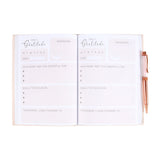







Reflect & Radiate- Gratitude Journal with Rose Quartz Pen
Experience the power of gratitude with our Gratitude Journal with Rose Quartz Pen. This journal is not just a tool for staying organized, but a powerful instrument for cultivating a positive mindset and promoting self-love.
The elegant A5 size design features high-quality materials, including a soft-touch cover and premium paper that is perfect for writing on. The pages are lined, helping you stay organized as you jot down your daily affirmations, set goals, and list the things you are thankful for.
But that's not all. The Gratitude Journal also comes with a matching rose quartz chip ballpoint pen. Rose quartz is a powerful crystal that is believed to promote love, happiness, and positive energy. By using this pen, you'll infuse your words with the same energy, making your gratitude practice even more potent.
Whether you're new to gratitude journaling or a seasoned pro, this journal is the perfect tool to help you cultivate a positive mindset and live your best life. It's also a meaningful and practical gift for anyone who wants to experience the power of gratitude.
gratitude journal is a wonderful tool for cultivating a positive mindset and focusing on the things you are thankful for in your life. Here are some directions and prompts for using a gratitude journal effectively:
1. Start with a Routine:
- Dedicate a specific time each day to journaling, whether it's in the morning, before bed, or during a break. Consistency is key to building this habit.
2. Begin with Gratitude:
- Start your journal entry by writing down three to five things you are grateful for. These can be big or small, from significant life events to everyday joys.
3. Be Specific:
- When expressing gratitude, be as specific as possible. Instead of writing "I'm grateful for my family," you could write "I'm grateful for the support and laughter my family provides."
4. Who/What Are You Grateful For:
- Reflect on the people, experiences, opportunities, or objects that brought positivity into your day. Acknowledge the positive impact they had on you.
5. Goals to Focus On:
- Write down one or two specific goals or intentions you want to focus on for the day. These can be related to personal growth, work, relationships, or any area of your life.
6. Tomorrow I Look Forward To:
- At the end of your journal entry, jot down something you are looking forward to tomorrow. It could be an event, a project, a meeting with a friend, or simply a new day filled with possibilities.
7. Avoid Repetition:
- While it's okay to express gratitude for the same things occasionally, try to diversify your entries to notice a broader range of positive aspects in your life.
8. Use Prompts:
- If you're struggling to come up with things to be grateful for, consider using prompts. For example:
- What made you smile today?
- Who inspired or helped you today?
- What progress did you make toward your goals?
- What beautiful or interesting things did you notice today?
9. Reflect on Your Entries:
- Periodically review your previous entries to see how your gratitude and focus on goals have evolved over time. It can be enlightening to track your personal growth and shifting priorities.
10. Make It Personal:
- Your gratitude journal is a reflection of your own thoughts and feelings. There's no right or wrong way to express gratitude, so make it personal and meaningful to you.
11. Keep It Simple:
- Your journaling doesn't have to be lengthy or elaborate. Even a few sentences a day can have a positive impact on your mindset.
12. Embrace Challenges:
- On days when life feels challenging, don't shy away from writing about the difficulties or frustrations you faced. Expressing gratitude during tough times can help you find silver linings and maintain resilience.
Using a gratitude journal can significantly improve your overall well-being and perspective on life. It can remind you to appreciate the positive aspects of your day and keep your goals in focus. Over time, this practice can lead to increased happiness and a more positive outlook on life.
-
Science of Happiness: Research in positive psychology has shown that keeping a gratitude journal can lead to increased happiness and life satisfaction. It helps shift your focus from what you lack to what you have.
-
Neurological Impact: Expressing gratitude can positively affect your brain. It activates areas associated with dopamine production, the "feel-good" neurotransmitter.
-
Physical Health Benefits: Gratitude has been linked to improved physical health. People who practice gratitude tend to experience lower blood pressure, reduced inflammation, and better immune function.
-
Emotional Resilience: Gratitude can enhance emotional resilience. It helps individuals cope better with stress and adversity by promoting a more positive mindset.
-
Better Sleep: Keeping a gratitude journal before bedtime can improve sleep quality. Focusing on positive aspects of your day can reduce anxious or negative thoughts that may interfere with sleep.
-
Enhanced Relationships: Expressing gratitude toward others can strengthen relationships. It fosters a sense of connection and appreciation between individuals.
-
Global Traditions: Gratitude practices are present in various cultures worldwide. Many cultures have rituals and traditions centered around thankfulness and appreciation.
-
Thanksgiving Influence: The holiday of Thanksgiving in the United States revolves around gratitude. It's a time when people gather with loved ones to express thanks for the blessings in their lives.
-
Gratitude Apps: In the digital age, there are smartphone apps specifically designed for gratitude journaling. These apps often include prompts, reminders, and the ability to add photos to your entries.
-
Self-Care Trend: Gratitude journaling has gained popularity as part of the self-care and wellness movement. It's seen as a simple yet powerful way to prioritize mental and emotional health.
-
Aging and Gratitude: Studies have shown that as people age, they tend to become more grateful. This shift in perspective can contribute to a greater sense of contentment in later life.
-
Children and Gratitude: Teaching children about gratitude can have lasting benefits. Gratitude activities and discussions can help children develop empathy, improve their manners, and build positive relationships.
-
Gratitude Challenges: Some people participate in gratitude challenges, where they aim to write down a certain number of things they're grateful for every day for a set period, such as 30 days.
-
Historical Figures: Many historical figures and influential people, including Albert Einstein and Oprah Winfrey, have spoken about the importance of gratitude in their lives.
-
Creative Expression: Some individuals use art, poetry, or creative writing as a form of gratitude journaling. It allows them to express their appreciation in unique and artistic ways.
Remember that a gratitude journal is a personal practice, and there are no strict rules. The key is to find what works best for you and to make it a regular habit to reap the many benefits of gratitude.
